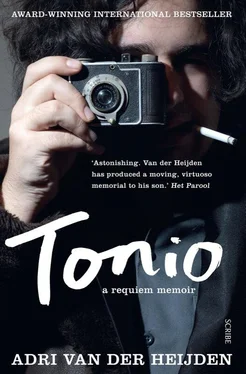For the next twenty years, the rule was: if a novel required two or three versions, then I would mark off that many blocks of 100 days on the calendar. Accordingly, the book I had been working on since the autumn of 2009 ( Kwaadschiks ) had already swallowed up two such time blocks. At the end of April I submitted a draft (but complete) typescript to the publisher. The last eight days of May plus the coming three summer months would be devoted to the definitive version.
Drawing up a schedule like this meant — with the requisite superstition — naming the days. Counting from a diary, I typed out 100 available days, and named them. Day 18, Day 19, Day 20 … Day 92, Day 93, Day 94 … Some of them got nicknames, depending on their contribution to the endeavour, but only after the fact.
Claiming and taking control of dates in advance: wasn’t that tempting Fate? Once they were numbered, they were still useful as empty time, but they were definitely no longer neutral. I had annexed them.
Each new schedule began with a Day Zero. In this case it fell on 23 May, today, Whit Sunday. A marvellous kind of temporal no-man’s-land. So as to soften the blow of Day One, I always saw to it that the production of Day Zero, expressed in pages, already met the target average. But at the same time, Day Zero was nonbinding and by definition could be a partial or even complete flop. Nothing would be lost.
So there I lay, while half of Amsterdam enjoyed its holiday sleep-in, looking forward to the imminent nonbinding workday, the start of which I could put off for as long as I pleased. Downstairs, in her workroom on the ground floor, Miriam would undoubtedly have already been at her computer for an hour-and-a-half or so. On weekdays, she usually got up at about six to go to the gym, and started working by half past eight, but Sundays she skipped the exercises, which gave her an extra hour in bed as well as an hour’s head start on her work. I wasn’t in such a hurry. Her concentration usually waned by noon, while mine was then at its best and only started flagging by late afternoon.
I pictured the cats sycophantically weaving figure eights around her legs under the computer table, manoeuvring for her attention, or, if that failed, stretching out ostentatiously across the keyboard. Our deal was that if I felt like coffee I’d phone, and she’d bring breakfast upstairs. I knew how it would go. Side by side, propped up on the pillows, talking over the day’s plans. In midweek the weather had suddenly turned warm. As we’d done the past few days, we would meet out on the back terrace at the end of afternoon, under the golden rain, for a glass of fruit juice. No need to cook: Tonio was coming to eat, and he had already placed an order for a portion of chow mein from the Surinamese takeaway.
I picked up my mobile phone from the bed but immediately laid it back down. Breakfast could wait. The only hitch in my wellbeing: my stomach — normally staunch, stout, and reliable — was in rather a bad way, and thus hindered my appetite. It couldn’t have anything to do with alcohol: we hadn’t touched a drop for several weeks now. I tried to remember what we had eaten the night before. Veal, because there was a marsala sauce — no, for scaloppine marsala Miriam had turned to organic chicken these days out of environmental concerns. The first course was spaghetti aglio olio , rich in darkly sautéed garlic, and, as a side dish, a salad that had been generously sprinkled with more freshly chopped garlic. Apparently a clove too many, because early that morning, somewhere between four and half past, I’d woken up to a clenching stomach, complete with an unstoppable flood of saliva. I sat upright in bed, continually swallowing, battling the nausea, until it subsided and I was able to lie back down.
3
Now, hours later, my stomach was still not entirely back to normal. Of course I could just ask Miriam for some coffee, a dash of espresso diluted with plenty of milk, but I decided to enjoy the comfy situation a bit longer on my own. It was fine like this. As Japi, from Nescio’s The Sponger , said: I was always getting myself worked up. Since cutting short a disastrous work visit to Lugano a year ago, I had asserted ownership of my time. I’d share part of it with Miriam (and with Tonio, if he so desired), but otherwise no one could lay any claim to it. Written enough letters, contributed to enough magazines. I was tired of buffing the regulars’ tables at assorted pubs with my jacket sleeves, not to mention all the language that evaporated out of your mouth, free of charge, and that could just as well have been written down at home.
And it worked. Every day was a gift. I once remarked to Miriam that ‘most people always came to get something, never to bring it’. It was a burst of pique, no more than that, but once I’d said it I realised it was true. Since then I made certain there was no longer anything to be had. I would continue bringing people things now and again, but all in due course.
My mind drifted back to the work schedule lying on the long wallpaper table upstairs. It lay next to the copy of the draft typescript I had submitted at the end of April. There was also a plastic folder containing 160 pages of the definitive version. I had written it more or less off the cuff, outside every hundred-day schedule. Thus there was a starting balance, so to speak, to compensate for the less productive days.
In short, I had my act together. I sank back onto the pillows, almost purring with pleasure. I would ring Miriam in a minute. After the coffee, and perhaps some lazy lovemaking, I would mount the exercise bike for half an hour, then it was just a matter of showering, getting dressed, and going upstairs. There, I would choose exactly the right moment to release the agreeably wound-up spring for the next 100 days.
4
And then the bell. One short, one long. Loud and invasive. In the echoing silence that followed, the thumping of the cats as they raced upstairs.
As always, the strident buzz of the doorbell irritated me (God, Miriam, weren’t we going to have the Brom people install a friendlier bell?), but now it was a sense of unease that made me sit straight up in bed. I turned my head to the right, glanced at my watch on the night table. Ten past nine. It was probably my mother-in-law. Lately she’d taken to showing up on our doorstep, befuddled, delivered by cab. The reason was usually that Miriam didn’t answer the phone or offer any other sign of life.
Yes, it had to be Wies. Who else? But … if I was so sure it was her, no more than an annoying incident, why did my already upset stomach tighten in anxiety? I slid out of bed, suppler than my back in reality allowed, and went out to the landing to hear what was going on. I went by way of the bathroom. At first it was as though the quiet had returned to the house. Miriam didn’t open the door, and her mother drove back off in the taxi.
My stomach and my heart did not share the relief being coaxed into my head. This wasn’t the first time I’d stood there, holding my breath, to see if Miriam opened the door. The mailman — wasn’t Miriam home? Should I answer via the intercom?
Something , perhaps the gust of air that blew up through the stairwell, told me the front door was open. I struggled with all my might to recognise my mother-in-law in the voice that rose up indistinctly from down below, but I knew that it was a man’s voice. The sound of Miriam’s brief and heated (but unintelligible) reaction offered the hope that she — as she often did in this kind of situation — was yelling at her mother. My fear spoke another language.
Just above me, Tygo and Tasha stuck their furry heads inquisitively through the balusters of the handrail. Downstairs, the glass doors to the hall rattled. A snippet of an unmistakably male voice, followed by an anguished cry from Miriam. The cats dashed down the stairs, their tails swishing along my bare legs as they crossed the landing and continued their patter down the stairs towards the cry of their mistress.
Читать дальше












